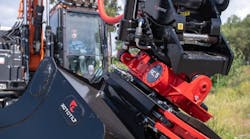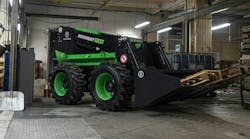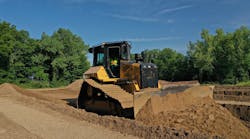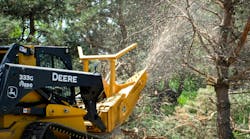Becoming a leader in the construction industry is the goal of any contractor. An industry leader is not always defined by how large the business becomes, but by the quality of work that those contractors accomplish. One company leading the turnkey site-development industry is Fowler Contracting, Inc., based in Raleigh-Durham-Chapel Hill, N.C.
"Being a leader is dependent upon a number of factors," says Steve Fowler, president and CEO of Fowler. "We've achieved it by bringing our projects in on time and on budget, which is the result of maintaining a skilled management team, a loyal and skilled workforce, and modern equipment."
Fowler believes modern equipment that is well maintained is one of the main reasons for his company's success. "A company's management must have the forethought to use state-of-the-art equipment and technologies in the planning, pursuit and cost control of projects. Having a competent maintenance force is essential to maximizing machine availability," said Fowler.
Since founding the company in 1984, Fowler has seen his organization expand immensely. By 2005, the number of employees grew from a meager three associates to a workforce of more than 450 people. But the core of his company is still a family business, and he credits growth to the quality of his management team. Fowler's wife Beth serves as office manager. His brother Robert is vice president of field operations and another brother, Ricky, is vice president of transportation. Rodney Bullock is controller; Chuck Smith serves as director of engineering; and Robbie Martin is general manager of heavy equipment.
A few pieces of equipment 20 years ago has today evolved into a heavy equipment spread of 350 pieces, including more than 50 Ingersoll-Rand SD-100F, SD-122F, SD-77, and SD-177DX compactors. Fowler purchased his first Ingersoll-Rand SD-100F in his first year of business. Although he's upgraded his compaction equipment spread since then, the company still owns and operates two of the original machines.
Fowler Contracting has a principal client base consisting of residential subdivision developers, and a majority of those are repeat customers, making it clear his business partnerships have served Fowler well.
The contracting company uses its Ingersoll-Rand machines for site grading, road building and underground utility trenching.
"I can tell you firsthand that the proper compaction of underground utility trenches is vital to the overall integrity of the project," said Mike Yenulevich, utilities superintendent for Fowler Contracting. "The majority of modern residential developments have utility lines installed underground and are done as fast as possible. We know doing this job efficiently and cost effectively requires a skilled crew equipped with the best equipment we can provide.
"We use the padfoot soil compactor on backfill to achieve the proper density, monitoring and adjusting the moisture content as we go. Once this is done, we use a smooth drum compactor to smooth out the marks left by the first roller and seal that final lift," said Yenulevich. With every day central to the completion date of the entire project, this helps the crew stay on schedule, he added.
Fowler Contracting uses 8-ton padfoot soil compactors for initial trench backfill compaction. The crew uses smooth drum vibratory compactors to seal the final trench compaction layer and prevent infiltration by rain. Fowler Contracting's 16 larger, heavier machines are 14-ton padfoot drum compactors used for heavy-duty site and road building compaction service.
Company officials say the advantage of owning and operating these machines is efficient use of their heavy frames and drum weights. The design forces more of the compactor impact weight directly onto the ground, permitting more consolidation with fewer passes.
Vibration design also makes the machines more efficient. Through vibration, the maximum useable force from the roller's drum is imparted into the various materials being compacted. Ingersoll-Rand compactors have variable frequencies for drums that give operators flexibility to choose the appropriate frequency for the particular material being compacted.
Ingersoll-Rand compaction manager Dale Starry says there are decidedly positive benefits in owning technologically advanced equipment. "There is in fact, an ability to show a profit from proper compaction. Some transportation agencies offer incentives to achieve specified compaction density and smoothness levels. For a contractor, that becomes a pay factor, in both earthwork and hot mix asphalt projects," said Starry.
Contemporary technology has the ability to produce greater uniformity results over longer distances. Many transportation agencies have an additional pay factor for overall uniformity as well as smoothness and density. In their bid specifications, these departments have a factor for evaluation of material density and smoothness through random sampling. For a contractor to be assured of receiving full pay and potential incentive bonuses on a project, the contractor needs to be certain there is uniformity in compaction results over the entire project.
Fowler is proud of his equipment fleet and his decision to use advanced technologies to improve productivity and reduce costs. He has equipped his in-house design and engineering staff with innovative 3-D computer programs to facilitate and expedite earthwork operations. Approximately $7 million was spent to outfit most of his earthmoving equipment with GPS technology. Fowler has also installed air conditioning in machine cabs to increase operator comfort and job productivity.
But advanced technology is only the beginning, said Fowler. A commitment to machine maintenance means the return on investment of the machines is high.
"Good equipment maintenance begins with good purchases, and I believe strongly in a stringent preventive maintenance program. We take our equipment maintenance to a higher level for two reasons. First, well-maintained machines are more productive and make you more money. The second reason is that we have developed a program that, when the time comes to replace the machine, we expect to sell it as close to retail as possible rather than selling it at auction level. We are averaging as much as 20-percent to 35-percent more than auction prices when we sell our compactors," Fowler said.
Fowler says quality employees aid in the maintenance of the compactors. "Owning state-of-the-art equipment allows us to be selective and employ only well-qualified operators who know the value of taking good care of their machines. That allows our equipment to spend more productive time in the field as opposed to being out of service and in our maintenance facility," he stated.
While financial reward is a popular incentive all on its own, Fowler knows that if clients are pleased with his crew's work, they'll help bring new projects to Fowler Contracting. Making smart purchases that keep up with technology are required to exceed customer expectations.
"Our clients expect nothing less than the quality of the equipment we use on their projects. They can feel confident about the work being done by our men and our machines," he said.




